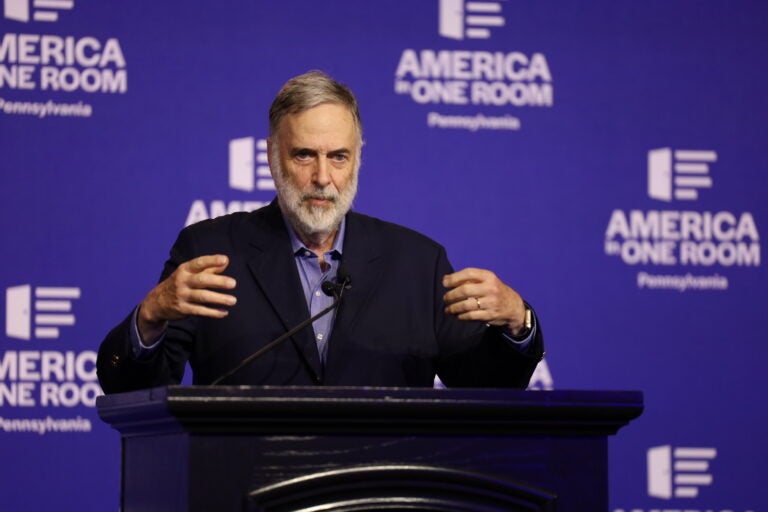Gov. Shapiro visits Philly to kick off ‘deliberative polling’ experiment, designed to engage voters across partisan gaps
“Deliberative polling” was developed in the 1990s. A three-day event will see if it can help Pennsylvania voters come together on common concerns.

Gov. Josh Shapiro addresses an audience at the Sheraton Downtown in Philadelphia to kick off America in One Room, a three-day deliberative polling experiment. (Carmen Russell-Sluchansky/WHYY)
From Philly and the Pa. suburbs to South Jersey and Delaware, what would you like WHYY News to cover? Let us know!
Gov. Josh Shapiro spoke at the Sheraton hotel in Center City Philadelphia Thursday night, addressing an audience invited from across Pennsylvania for what organizers say may be the future of political discourse.
Nearly 200 people gathered at the hotel for three days of group discussions on major and controversial issues, an effort for participants to talk across partisan lines but also gauge their positions on controversial issues.
Shapiro said that it was people like those in the audience that pushed for American independence and made America what it is, rather than politicians like himself.
“Every chapter of our American story over the last 250 years hasn’t been written by people with titles next to their names, but by ordinary Americans who decided to take up that same spirit that we found on the streets of Philadelphia and the taverns of Philadelphia, the town squares of Philadelphia, 250 years ago,” he said.
America in One Room is a nonpartisan initiative developed by Helena and Stanford University’s Deliberative Democracy Lab. They employ “deliberative polling” techniques “to engage voters in civil political discourse and understand voter sentiment on a deeper level to get a truer measurement of how far apart opinions are on pressing policy issues and proposals,” according to event materials.
First developed in the 1990s by Stanford University professor James Fishkin, deliberative polling is a form of public opinion research that seeks to measure what people would think about complex policy issues if they had more time, information and opportunities to discuss the topic in depth.
Unlike traditional polling, which captures surface-level opinions often based on limited information, deliberative polling brings together a representative sample of citizens who are given balanced briefing materials, hear from competing experts, and engage in small group discussions led by trained moderators. Participants take a survey before and after the process, allowing researchers to see how opinions shift when voters are better informed.
Fishkin’s method has been used in dozens of countries and on a range of issues, from exploring perspectives on infrastructure projects in China to researching thoughts on gas projects in Tanzania. Advocates say deliberative polling can help restore trust in democratic processes by emphasizing informed, respectful dialogue over partisan sound bites.
Critics argue that the process is costly and time-consuming. For the local event, America in One Room is covering transportation and hotel costs and also paying participants for their time, making it many times more expensive than more traditional polls or focus groups. Others point out that they can only reach a small subset of the population, say around 200 out of a population of 13 million in the commonwealth.
However, as concerns about polarization and misinformation have become ubiquitous in recent times, some see deliberative polling as a promising tool for civic engagement and policymaking that can help bridge partisan gaps and provide elected officials nonpartisan information about what their constituency thinks. Fishkin made that very point when he addressed the audience at the Sheraton.
“Some of my colleagues in political science have written enormous numbers of things about how we’re so divided, that the divisions are so intractable and the people are not capable of deliberating about policy,” he told the audience. “I say otherwise, and we now have 160 experiments around the world, many in the U.S., many in other countries that show that the public is ultimately very smart if you engage them in the issues.”
Stanford and Helena collectively launched America in One Room in 2019, and they have utilized the deliberative polling process in national research projects, including tackling major issues in the 2020 and 2024 presidential races. This weekend’s event marks the first time they are focusing on participants and issues of a single state — choosing one that plays an outsized role in U.S. national politics.
Participants will take part in large group sessions and breakouts in which they will discuss a variety of issues. State House Speaker Joanna McClinton is scheduled to participate Saturday.
In his speech, Shapiro said participants were going into situations that resemble the government in Harrisburg with its divided legislature.
“My job is to solve problems every day, and literally the only way I can solve a problem and pass a bill is with Republican votes and Democratic votes,” he said. “So in many ways you are kind of a microcosm of what we’re dealing with all across Pennsylvania and what I deal with every single day in the legislature, which is to find ways to bring Republicans and Democrats together to get stuff done.”
Patrick Dooley, a local participant, said that’s part of why he is here: to talk with people who don’t always share his beliefs.
“If you see people as human and see their pain a little bit and see where they’re coming from, that’ll give you the opportunity to see things from a different perspective,” he said. “And if you do that, you could see why they’re maybe voting against what you think is their own interest.
The recovery specialist at the University of Pennsylvania’s Center for Addiction Medicine and Policy said he leans left, adding that he has high hopes for finding common ground over the weekend.

Get daily updates from WHYY News!
WHYY is your source for fact-based, in-depth journalism and information. As a nonprofit organization, we rely on financial support from readers like you. Please give today.













